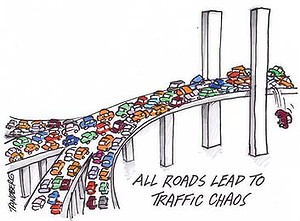 |
| Image from The Age |
The data shows that public transport use increased by 4.5% in 2011-2012 compared to the previous year, and the increases have particularly come from increased bus use (up by 16%, whereas trams were up 4.5% and train use actually declined by 3.3%).
It's also great to see that bike use has increased by 33% since 2007 (6% per year on average). This is especially interesting in light of a recent piece by futurist Syd Mead, who reckons that bikes should not actually be taken seriously as a mode of transport for commutes.
"Today there is an almost messianic insistence that bicycles should be a part of the urban transit mix", which he describes as 'specious folly' (really misleading).
However, Bicycle Network Victoria's Jason den Hollander stated that ''Bikes compete well for commuting in terms of time, parking and cost".
Despite these increases in bike travel and public transport, in 2012, Melbourne showed an 80% modal split to private car use. It's also clear that addressing road infrastructure comes first:
''The Napthine government will spend more than $8 billion part-constructing the east-west link, leaving little to no money to spend on improving other major arterial or regional roads, let alone being able to fund public transport improvements, which are desperately needed''
Why are we so concerned with making it easier for cars? I went through the Plantastic archives and dug up Rupe's post 'Irritate Drivers - Create Great Cities?'.
"While American cities are synchronizing green lights to improve traffic flow and offering apps to help drivers find parking, many European cities are doing the opposite: creating environments openly hostile to cars. The methods vary, but the mission is clear — to make car use expensive and just plain miserable enough to tilt drivers toward more environmentally friendly modes of transportation."
Irritating motorists is clearly something our politicians are not game enough to do.
For more the bike-dissing futurist, check out the Urbanist Post, or straight to Mead's article.
Also, this link provides a useful comparison of modal share for Australian and international cities.









